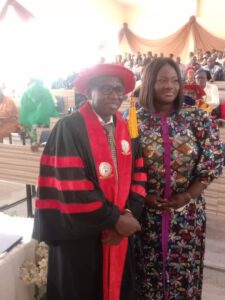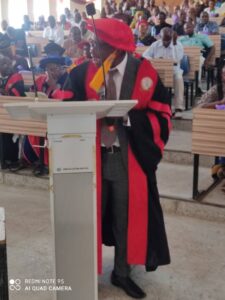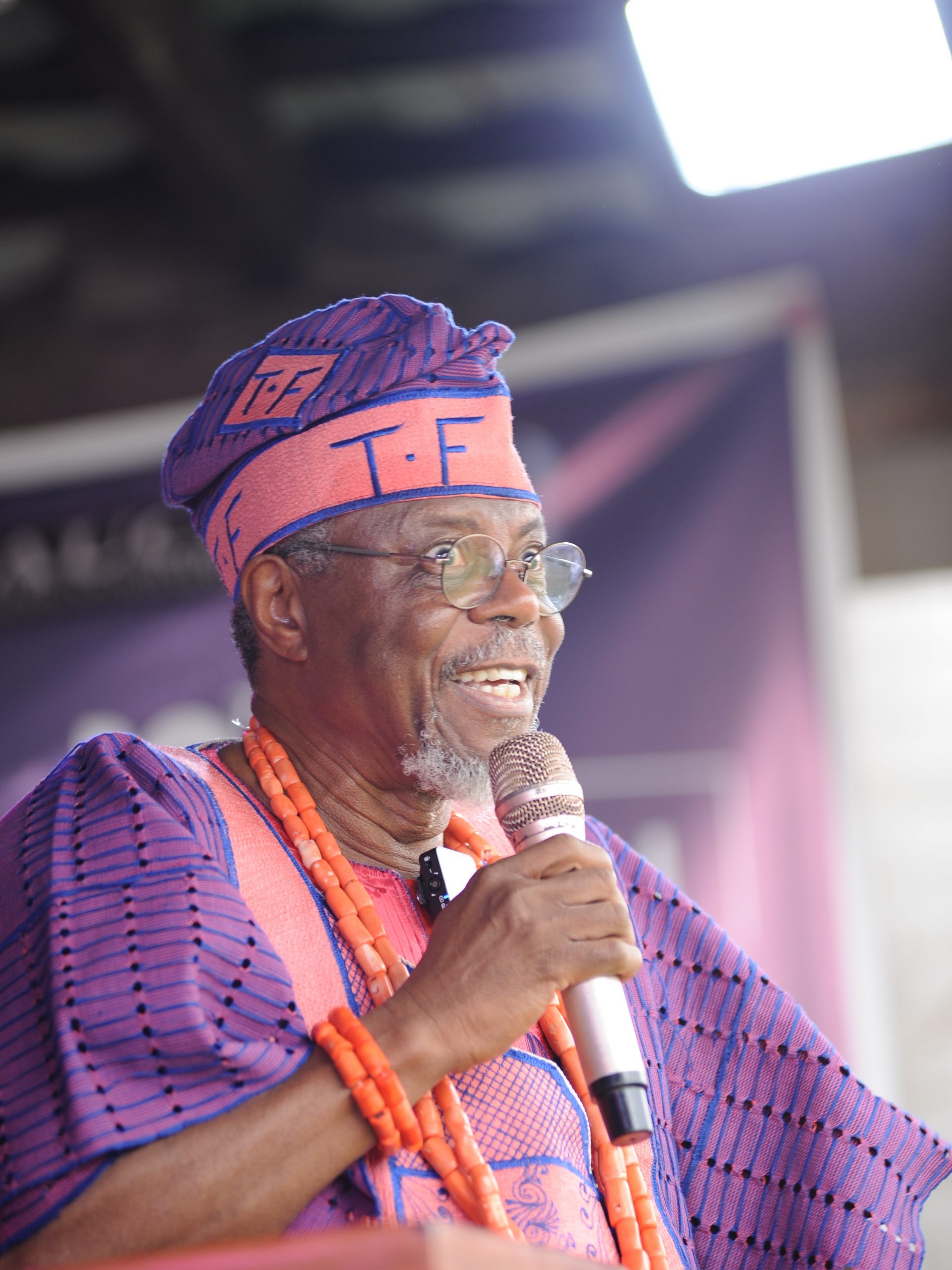By Toyin Falola
Professor Ochayi Okpeh, a professor of African History at the Federal University of Lafia, made history as one of the first ten to deliver an inaugural lecture at the institution. On Tuesday, February 14, 2023, Prof. Okpeh delivered his Inaugural Lecture, “The Historian as a Catalyst: History, Ideology, and the Social Process”. I was privileged to receive the lecture before delivery, mid-air between three countries. I rescheduled my connecting flight to join the Inaugural via Zoom. Outspoken, trenchant, combative and assertive, he made a case for History, for the Academic Staff Union of Nigerian Universities (ASUU) and the Historical Society of Nigeria (HSN). A mordant voice with stinging words well directed, his vitriolic is on target.
 Prof Okpeh and his wife
Prof Okpeh and his wife
Anyone who has known Prof. Okpeh or comes into contact with the details of his work can tell that the selected title is a brief encapsulation of Okpeh’s life and commitment, not only as an academic but also as an activist-historian. In extending his contributions beyond the theoretical frameworks of history as a field of study, Okpeh has also contributed to research and achievements in gender studies, inter-group relations, political science, development in contemporary Nigeria, and Pan-African Studies. It is wonderful to see that the conferment of a professorial title on Okpeh has eventually witnessed all the full rites, the last of which — in most Nigerian institutions — is often an inaugural lecture. Although he has been an appointed professor for 13 years, first at the Benue State University and now at the Federal University of Lafia, we all have benefitted from his lecture delay.
His tribute to the University of Jos is inspiring. That acknowledgement shows his character. Foolish people declared themselves self-made and burned the bridge after crossing it. Whether a bridge that takes you to a positive definition is straight or crooked does not mean that you set it on fire after you have crossed it. Others need the bridge. I know of one such foolish person who failed his PhD and was later rescued, later to abuse all those he met along the way and destroy those who hired him. I cried with the Vice-Chancellor who hired him. I cried with the late Professor Bayo Lawal, who this fellow accused of sleeping with his wife. By the time he accused another of sleeping with his wife, people were asking whether it was the black-looking one or the red-looking one. Be careful of a man who can publicly tarnish his own wife for political calculations. Okpeh, the wise, remembers his origins with legendary acknowledgement. As I told someone, for the honour done to Jos, Peter will forgive him all his sins, and the gate of heaven will be thrown open for his glorious entrance.
Okpeh went to Jos, my alma mater, aiming to read Law but was admitted for History. The University of Lagos admitted me for Law, but I turned it down! Sometimes, our eventual paths are mapped out after disappointment and failure; the same was for Professor Okpeh. While I have no doubts that he would have equally succeeded in law — either as a practising lawyer or an academic — the field of history would have lost a great addition to its ranks if the initial plan of studying law had succeeded in Okpeh’s case. It took failure, disappointment, and an encounter with history to convince the academic that he had eventually found his path, and it is amazing to see how he has seen exponential growth in his career since then. Within 15 years of joining the faculty at the Benue State University Department of History, Okpeh was conferred with a professorial title, an achievement that places him among the fastest to be conferred in contemporary Nigerian academia.
Ochayi Okpeh is one of the astute and most dedicated scholars in the historical field in Nigeria. He is a serial researcher and editor that is always ready to contribute to new research or bodies of work in the field. Having collaborated with him on several projects, including Warfare, Ethnicity, and National Identity in Nigeria, and Population Movements, Conflicts, and Displacements, among others. Okpeh’s output rate and the quality of his books and research papers lend credence to his work and contributions to the field. Working as both an academic and- a professional historian, Okpeh’s contributions have cut across both the town and the gown, a solid reason why the title of activist-historian is befitting for him.

Okpeh’s scholarly outputs and work are founded on an underlying belief that a historian is a change-maker. This underlying belief forms the fibres of the principles that guide Okpeh’s approach, research methodologies, academic quests, and choice of themes to focus on in his research pursuits. In examining the significance of this underlying belief — first to his work and also to the overall work of historians and their translated influence on the world — it is vital to note that history exists primarily as a channel through which we engage our past not only to understand the said past but more importantly to decode how the past influences the present and how it could influence the future. Therefore, the historian is not only a theorist or a scholar; they also serve to help us understand the motives and factors influencing present happenings, a role that, if played right, could lead to the historian positively influencing society on its choices and decisions — ergo, the claim that historians are also change-makers and catalysts. Equipped with deep-founded knowledge, research tools and methodologies and the right questions, Okpeh has historically examined the present happenings in Nigerian societies and within the Nigerian spatial entity.
Beyond being a body of knowledge, history as a field of study is also a multi-functional tool for societal development and change. The multi-functional characteristics of history come to play in several instances, one of which is to serve as a tool for discovering identity — whether it is that of the self, the ethnic group, or the country-state. Identity is a multi-layered concept, where humans constantly seek to contextualize their known identity by juxtaposing it with other identities or carving it out within other identities. Nigeria has not fully tapped into the potential of its national history, which is why the country struggles to pinpoint its national identity and pass the same to its citizens.
Although self-identity and ethnic identity seem strong among Nigerians, a lack of founded national identity makes it difficult or impossible for Nigerians to contextualize their self and ethnic identities within their national identity — or what could be termed their Nigerianness. In turn, this has led to a gross lack of national cohesion, patriotism, and commitment to a central goal among citizens of the country. Okpeh’s writings on inter-ethnic relations, migration, identity, and citizenship have all come from wanting to ask the big questions to extrapolate the concept of belonging and historiography.
Historical knowledge, although vital, does not enjoy enough recognition and application in our societies, especially in developing countries like Nigeria. The discrimination against history as a research field and disregard for it as a field of study are increasingly becoming widespread. This disregard and discrimination stem from the general disregard the humanities suffer in countries like Nigeria, where more seemingly practical-based fields like science and technology are overly emphasized and to the detriment of other fields. This is not to say the focus on science and technology is inherently wrong. However, suppose such focus ultimately leads to the near abandonment of other fields. In that case, it is problematic, especially as fields like history are germane to the catalytic growth of a country-state if applied history is implemented.
As an activist-historian, Okpeh has headlined the advocacy for the revival of the status of history as a field of study. This advocacy has aligned with reshaping people’s perceptions of history as a field of study and making the course attractive to potential students. The disregard for history has been so widespread that, at a time, the Nigerian government eliminated history from the curriculums of primary and secondary schools. And even without the elimination, several the bulk of the pre-tertiary schools in the country do not offer history as a subject.
 Prof Okpeh
Prof Okpeh
What that then means is that the students do not receive the grounding and foundational knowledge they need in history, so those of them that eventually end up as students of history in tertiary institutions are newly introduced to the course do not have the foundational knowledge of it, and may not perform as expected. Beyond that, they’re also often students with little to no interest in the course and are not committed to learning it or understanding its many use cases and applications worldwide. The downside is that most of the graduates that history departments in universities across Nigeria churn out are neither passionate about the field nor interested enough to gain profound knowledge. Several of them opted for history because many universities in the country have added the suffix “international relations” or “international studies” to studying history. In turn, these half-baked graduates end up as the teachers passing on half-baked foundational knowledge to those in pre-tertiary levels of education, giving them a shabby foundation that would further be affected as they advance in their studies. And so does the seemingly unbreakable circle continue. Although history is not the only field of study plagued by half-baked or dispassionate graduates, the issue is glaring and remains a worry, as history plays a fundamental and catalytic role in societal development and growth. How will we expect growth-oriented interrogation of historical issues and historiographical examinations of current happenings from people who know little about the research methodologies in history?
Professor Okpeh’s work as an activist-historian has involved engaging and elevating historical knowledge and scholarship as a basis for understanding human society, thus ultimately contributing to the body of work on Nigerian and African history. Furthermore, he has helped generate historical consciousness and propagated its deployment in interrogating contemporary development questions confronting Nigeria in particular and the continent of Africa at the broader level. In addition, he has been involved in the struggles of contemporary Nigerian historians against the postcolonial Nigerian state and how the ruling elite has strived to negate history and Nigerians’ collective memory as a people;
Okpeh’s dedication to provoking change and transformation in the operations of Nigeria’s public university system for the common good is yet another reason he is an activist-historian. He has embarked on this mission by taking up several roles in the administration of the universities he has worked at. While coordinating the Benue State University’s Diploma in Nigerian Cultural Studies, Okpeh and his team worked on a strategic collaboration with the Ministry of Culture within North-Central states in the country, thus getting tasked with the mission to train staff members of the ministry in each state in Nigerian Cultural Studies. This move, although beneficial to the institution, would have been more beneficial to the trainees and the ministries, seeing as it would be a solid way to train the ministries’ staff members on cultural appreciation and awareness, a training that would also invariably be beneficial to the states.
Okpeh’s contributions to the field — both as an academic and an activist — have been immense, and I felicitate him on delivering his inaugural lecture and being formally inaugurated as a Professor of African History. We can only expect that he will continue to deploy history as a valid tool for activism, advocacy, and growth-oriented interventions. Let me end this piece not with my words but with those of Professor Okpeh:
For almost three decades now, I have actively participated in civil society activities at different levels and in different parts of the country and the continent of Africa. My involvement with these organisations is based on my convictions that Civil Society Organisations (CSOs) are alternatives to formal state structures and by the nature and character of their engagements, they are more directly connected with the yearnings and aspirations of the people[1]. By their mandates, they represent alternative voices in the governance process and offered me yet another outlet to ventilate my commitment as a professional historian in the scholar – activist tradition alluded to earlier. After years of closely relating with these organisations, I was soon to realise how many of them are actually agents of imperialism masquerading as apostles of people’s rights in Africa. Indeed, the politics of development, which amplified their activities in contemporary Africa necessarily transformed many of them into the Trojan horses of neoliberalism and the recolonisation agenda of the West. This realisation was to underscore my aloofness and caution in dealing with most of the CSOs who constantly inundated me with requests for consultancy.
[1] Okpeh O. Okpeh, Jr., “Democracy in Nigeria: The Role of Civil Society Organisation”, Nigeria Social Science Review, Vol. 1, No, 1 (December 2004), 1-14


